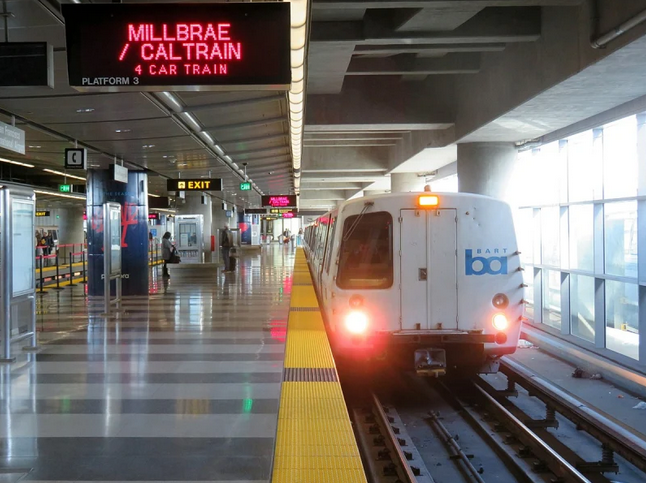While some Bay Area legislators supported the idea of raising bridge tolls to help fund transit, there was enough opposition that its author, Senator Scott Wiener (D-San Francisco), decided to put S.B. 532 on ice for now.
The bill was slated to be heard in the Assembly Appropriations Committee this week.
S.B. 532 had floated a temporary $1.50 increase to Bay Area bridge tolls to help fund public transportation. It was an "eleventh hour effort," in Senator Wiener's words, to stave off service cuts in the face of an approaching $2.5 billion shortfall. While proposed cuts in this year's state budget were ultimately walked back, the fact is public transportation still needs much more investment.
The temporary bridge toll increase was supposed to give agencies some breathing room. It also served to stir up discussion among legislators who were sitting on the sidelines of efforts to save transit.
Some suburban representatives saw S.B. 532 as a way to take money from their constituents for transit that none of them use. Opponents included not just regional representatives at the state level but also members of Congress, who sent a letter to Governor Newsom to express their disapproval. The signatories of that letter were Representatives Mark DeSaulnier (D-Walnut Creek), Anna Eshoo (D-Menlo Park), John Garamendi (D-Walnut Grove), Barbara Lee (D-Oakland), Linda Sanchez (D-Whittier), Eric Swalwell (D-Livermore), and Mike Thompson (D-St. Helena).
At the state level, opponents include Senators Bill Dodd (D-Napa) and Steve Glazer (D-Orinda) and Assemblymembers Rebecca Bauer-Kahan (D-Orinda), Timothy Grayson (D-Concord,) Damon Connolly (D-San Rafael) and Lori Wilson (D-Suisun City). They objected to what they saw as a money grab from their constituents, who, they claim, "must" drive because they commute farther than people who have access to more frequent transit. They see it as a bailout by drivers who don't ride transit - never mind what their commutes would be like if that transit didn't move so many people off the roads they want to drive to get to work.
The letter from the congressional members also charged that raising bridge tolls would harm low-income drivers "who must commute across bridges because they cannot afford to live near where they work."
While these claims might be worth discussing, it makes little sense to accept them at face value. No one wants to pay more to get to work, but many of those outlying areas are served by buses and trains right into city centers, and while transit doesn't work for everybody, without it even the roads won't work. In addition, while high tolls are a pain, they pale in comparison to the rest of the costs of driving, including car payments, parking, and fuel. And low-income people are the ones who suffer most when public transit is inadequate.
But the opponents made some good points about accountability. It's true that just pouring money into the existing systems isn't a long-term solution, and that the entire transit landscape needs a better plan. The congressional reps asked for, among other things, a plan for oversight of the funds and an analysis of which agencies would get how much and what they would use it for.
But more than that is needed. Seamless Bay Area and SPUR are two organizations that have spent a lot of time engaging the public, riders, and leaders on these issues, but barriers continue to hold back their vision.
Senator Wiener has joined with Assemblymember Wilson to convene a working group in the fall to discuss transit funding proposals that could be supported by a wider range of legislators.
Senator Wiener had convened a select committee on Bay Area Public Transportation this spring, but it held only one hearing. Many of the leaders who oppose S.B 532 didn't show up for that hearing; hopefully now they will.
Assemblymember Wilson said about the upcoming legislative work group: “Californians deserve consistent and reliable public transportation. We need to invest in our public transit agencies in a thorough and comprehensive manner. We need to ensure there is accountability and verifiable data collection so that our proposed solutions are evidence-based and defensible to those being asked to bear the burden of this investment."
Senator Wiener is hoping for consensus among legislators on how to move forward, and says he is committed to continuing to lead efforts to provide reliable, affordable transportation for everyone.






